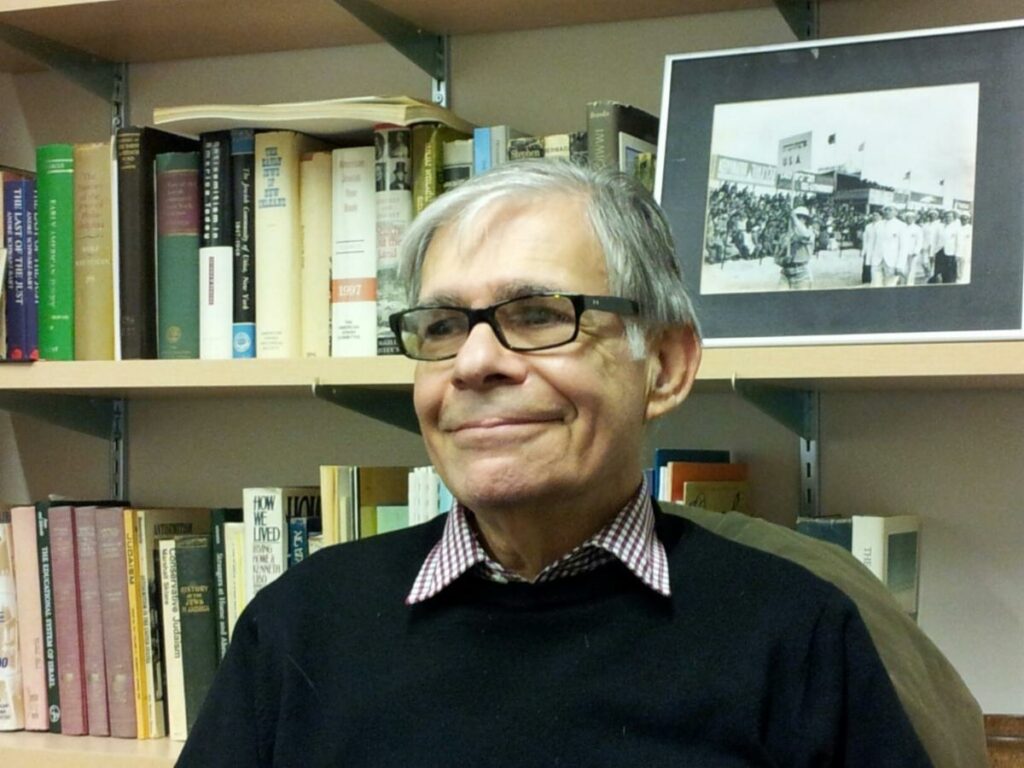
York University’s Israel and Golda Koschitzky Centre for Jewish Studies (CJS) has announced that founding member, esteemed professor emeritus and rabbi, Michael Brown, passed away on March 17 in Montreal.

“Last year around this time, my fellow Jewish Studies faculty members and I nominated Professor Brown to be recognized with the Association for Canadian Jewish Studies’ 2022 Louis Rosenberg Distinguished Service Award,” CJS Acting Director David S. Koffman wrote in a statement. “It was an honour for which he was eminently due, given his truly superlative accomplishments over the course of his impactful career and lifelong contributions to Canadian Jewish studies. On behalf of the entire Centre’s faculty and community, I extend my deepest sympathies to Michael’s family and friends…”
Brown was born in 1938 in Scranton, PA. He earned a BA from Harvard College in 1960 and a MA from Columbia University in 1963, later training for the rabbinate and becoming ordained at the Jewish Theological Seminary in 1968. Returning to academia shortly thereafter, Brown defended his PhD at the State University of New York at Buffalo in 1976.
During his PhD, Brown was sought out by York University to create the Jewish Studies Program. He went on to hire the vast majority of faculty members who would instruct in the program. At York, Brown established the Silber Family Chair in Modern Jewish History, the J. Richard Shiff Chair for the Study of Canadian Jewry and the Koschtizky Family Chair in Jewish Teacher Education before ultimately founding the Israel & Golda Koschitzky Centre for Jewish Studies, which he directed from 1995 to 2002.
Over his half-century career, Brown published in research areas including history, literature, political science and education and became the first university professor to instruct courses in Canadian Jewish life.
His tenure at York saw him teach more than 20 unique courses to thousands of students in every stage of their education, some of these courses included American and Canadian Jewish Literature and History; Zionism in the English-Speaking World; Modern Israeli Literature and Society; Greek and Biblical Traditions; The Final Solution; and Problems in Judaism: Historical, Literary, and Mythological Uses of Jewish History.
Adapting an earlier speech delivered at a ceremony in honour of Brown, Koffman wrote that Brown’s “published work on Jewish education, including Teaching Teachers (2000), with Alex Pomson and Sydney Eisen; Creating the Jewish Future (1999), with Bernard Lightman; and Approaches to Antisemitism: Context and Curriculum (1994), remain influential.
“His leadership activities included his role as liaison between the Faculty of Education and the Holocaust Remembrance Committee of the Canadian Jewish Congress. He developed the unique Mark and Gail Appel Program in Holocaust and Anti-Racism Education – recently revived for the coming years – as a means to train future formal and informal educators about the Holocaust, antisemitism and racism, and brought together an international group of students in education, journalism and other fields to study Holocaust history, post-war responses in Germany and Poland, and Canadian perspectives on the Holocaust and genocide.”
Outside of York, Brown acted in leadership roles at multiple academic institutions. He was a visiting professor at the Institute of Contemporary Jewry, the Canadian Studies Program at the Hebrew University of Jerusalem, the University of California at San Diego and at the University of Toronto. He was a Fellow at the Jerusalem Center for Public Affairs and an editorial advisory board member of the Canadian Jewish News, Koffman wrote.
Among Brown’s noted published books are Not Written in Stone: Jews, Constitutions, and Constitutionalism in Canada (2003); Jew or Juif? Jews, French Canadians, and Anglo-Canadians, 1759-1914 (1986); the resource volumes, Jews and Judaism: A Bibliography of Jewish Canadiana, 1965-2000 (2000); and “A Guide to the Study of Jewish Civilization in Canadian Universities.” With Sara Horowitz, he co-edited Encounter with Aharon Appelfeld (2003), about the famed Israeli author.
"In addition to his books, Professor Brown published some 35 book chapters, including: studies on Jewish summer camping; Jewish women’s history; Jewish teacher education; and Canadian antisemitism, bi-nationalism, multiculturalism, and Zionism. He also published 22 articles in refereed journals, in both English and Hebrew, including works on Rabbi Stuart E. Rosenberg, the rise of reform Judaism in Canada, the Hart affair, aliyah from Canada, the diaspora Hebrew press, and the North American dimensions of key Zionist leaders, including Chaim Nahman Bialik, Vladimir Jabotinsky, and Golda Meir. With over 30 additional publications over and above his books, chapters and peer-reviewed articles, Professor Brown’s output was extraordinary," the statement from Koffman noted.
No stranger to local synagogue groups, camps and initiatives, Brown also committed his time to Toronto’s Associated Hebrew Schools; TanenbaumCHAT; the United Synagogue Day School; Camp Ramah's North America wide Mador program for emerging educators; Bet Sefer Le-Dugma in Jerusalem; the National Board of License for Teachers of Hebrew in North America and Academic Advisory Board; and the Moscow Center for University Teaching of Jewish Civilization.
For all of these achievements, in addition to the 2022 Louis Rosenberg Award, Brown was also previously honoured with a Medal of Honour by the Adam Mickiewicz University of Poznan, Poland, which specifically recognized his work in Holocaust education as America-Holy Land Fellow at the Hebrew University.
“Professor Brown, as all those who knew him know attest, was a gentleman and a scholar, a friend, an inspiration and a mentch. He will be sorely missed,” Koffman said.
